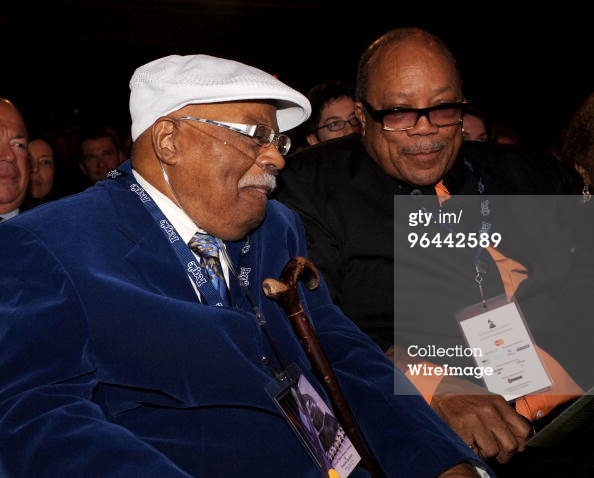60 Years of Collaboration

Clark Terry’s willingness to share his musical gifts and insights has made him one of the most beloved figures in jazz history. The widely-reported visit that Wynton Marsalis and the Jazz at Lincoln Center Orchestra paid to the 94-year-old trumpeter in Pine Bluff, Arkansas, last month was only the most recent example of the love and respect that CT enjoys among colleagues and protégés.
Quincy Jones was a high school student in Seattle in the early ‘50’s when he first approached Clark for a trumpet lesson. “He used to come through town with Count Basie. I’d say, ‘Mr. Terry, I’d really love to study trumpet with you.’ He said, ‘Well, what’s a good time?’ I said, ‘The only time I can do it is before I go to school at 6:30.’ He said, ‘I don’t get home until 2 or 3 in the morning’.” But CT made the time, and Quincy says, “He taught me how to put the trumpet on top of my lip on high notes so I didn’t bleed when I played.”
In his memoir, Q: The Autobiography of Quincy Jones, he writes, “[Basie’s] trumpet man Clark Terry practically adopted me. He taught me and talked to me and gave me confidence to get out there and see what I could do on my own. These are the guys who really trained me; they were my idols as musicians, but even more important, they were my role models as human beings. They were more concerned about getting better than about getting over.”
Clark made his first album as a leader 60 years ago this week. He was 34 and a veteran of the orchestras of Charlie Barnet, Lionel Hampton, Basie, and Duke Ellington when he recorded Clark Terry for EmArcy Records. The album was laid out by CT and Quincy Jones on New Year’s Eve and recorded on January 3 and 4, 1955. Terry’s bonafides as a big band trumpeter were clearly established by this time, but his debut showcased him with a hard-bop oriented sextet playing charts that made their points fast and left plenty of room for blowing. The band includes Jimmy Cleveland, Cecil Payne, Horace Silver, Wendell Marshall, and Art Blakey, with Oscar Pettiford featured on cello on several titles.
Clark Terry has lately been reissued by Lonehill Jazz under the title Swahili, the Quincy Jones original that opens the session. It’s the album feature in tonight’s Jazz à la Mode. Here’s Clark soloing with Jones’s orchestra in Paris in 1960 on the Bobby Timmons soul jazz classic, Moanin’.